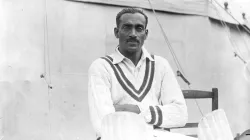Who was Col CK Nayudu, the great son of India on whose name BCCI confers Lifetime Achievement Awards?
Col CK Nayudu holds the distinction of being the first-ever captain of an Indian team. He is considered one of the greatest cricketers and one who paved the way for India to become a Test nation. Nayudu also holds the record for the longest first-class career.

In a special evening on Monday, the Board of Control for Cricket in India (BCCI) honoured Indian cricketers with laurels and honours to mark their contribution to the sport. Former cricketers Ravi Shastri and Farokh Engineer were bestowed with the Col CK Nayudu Lifetime Achievement Award, the honour which is the highest in Indian cricket.
Shastri is a 1983 World Cup winner and a well-renowned coach. He was at the helm of the Indian team's coaching staff during India's twin historic series wins against Australia Down Under. Legendary Farokh has played 46 Tests for India where he scored 2611 runs and made over 13000 runs in first-class cricket. The duo are added to the selected list of players to have won the honour named after Col CK Nayudu.
Who was CK Nayudu?
CK Nayudu was born into a family of lawyers on 31st October 1895. He made his first-class debut in 1916 in a first-class career that spanned a world record 47 years till 1963. He holds the special distinction of being India's first-ever captain when India toured England in 1932 for a one-off Test. Earlier a defensive batsman, Nayudu was encouraged to take up the attacking role by his father - Surya Prakash Rao Nayudu. He took up the role so perfectly that he became a reputed aggressive batter who loved to hit sixes for fun.
Nayudu's first scoring shot was also a six in first-class cricket. One of his most famous knocks came while playing for Hindus against the Marylebone Cricket Club in 1926/27 at Bombay Gymkhana. He smashed a century in just 66 minutes and went on to score 153 runs in 116 minutes. He was presented with a Silver bat by the MCC. The innings was a special one in Indian cricket as it paved the way for India's recognition as a Test nation.
Taking note of his knock, English journalist Simon Barnes wrote for Wisden India Almanack 2016, "Here was an innings that changed sporting history and perhaps affected real history as well. Certainly, it subverted the archetype of the Indian cricketer, at least as viewed by the English, as someone under-sized, meek, and rather devious. Here was an innings that stood for extravagance, high spirits and flamboyance."
His love for big shots speaks volumes that one of his sixes was estimated to be 140m long, clearing the Chepauk Stadium and going about 46m beyond it. This came in a match against Europeans in December 1920 when he made 120 runs.
Nayudu led India in four Tests overall. Even though he did not score big knocks, his innings were of substance and importance and showed his grit. Nayudu and Lala Amarnath put up a partnership of 186 for the third wicket in a Test against England when they toured India in 1933-34. In his last Test in 1936, Nayudu made his top score - 81 despite getting hit with by Gubby Allen.
After his Test retirement, he kept on representing different domestic sides in first-class cricket. After playing for India, he led his Holkar team to eight Ranji Trophy finals in nine years. The Legend also holds another special distinction of scoring a double hundred in the Ranji Trophy after turning 50. Nayud later joined the BCCI administration and was sworn in as the vice-president and chief national selector. The Indian Board introduced the prestigious CK Nayudu Lifetime Achievement Award in 1994 and his partner Lala Amarnath was bestowed with it that year.